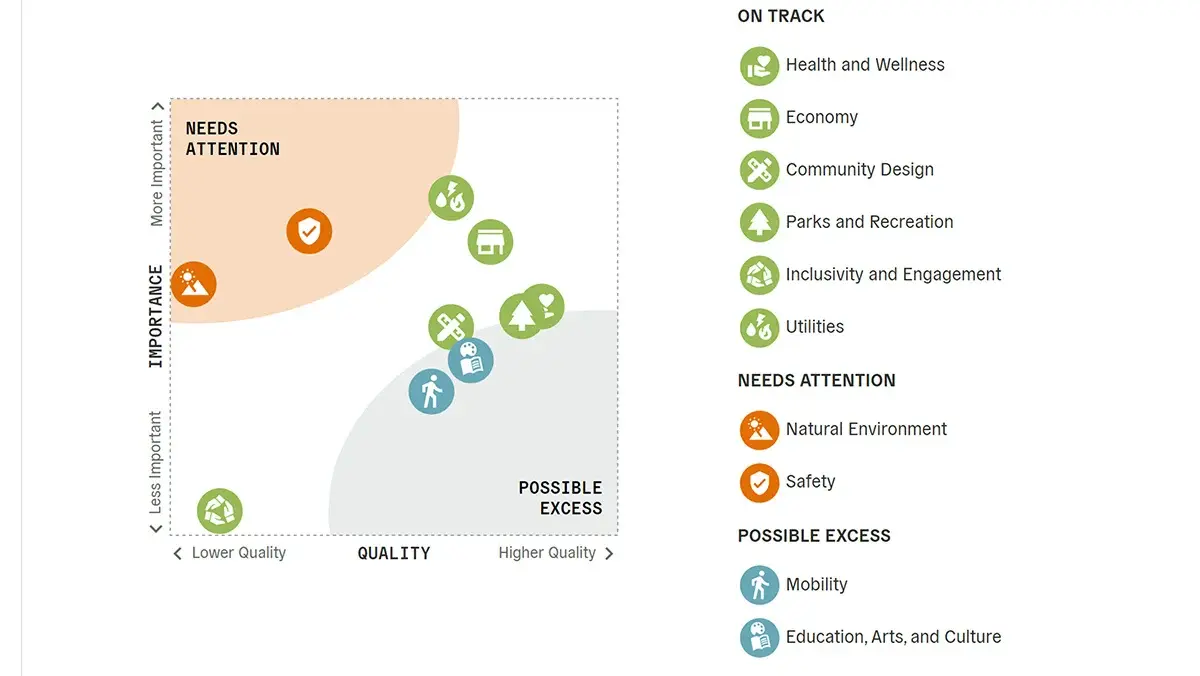How to Cultivate Personal Wellness at Work
By NRC on January 26, 2016

- By Annika Erickson-Pearson -
We spend a lot of time at our desks, working to make other people happy: our bosses, clients, constituents, even our families and friends. It’s easy to get carried away in the metrics and time-cards and key performance indicators of it all, but it’s crucial to remember the more we take care of ourselves, the better work we can produce.
The National Citizen SurveyTM provides data on quality of life for municipalities across the nation. As leaders, civil servants and researchers, we tend to focus on these data because we care about what citizens are saying about their quality of life. That said, we should also care for our own quality of life and happiness.
So, without further ado,
here are my top ten tips for personal wellness:
1. Get enough sleep!

You might have to shift around some priorities, but this should be at the top of your list. Falling asleep at the office makes us ineffective, thereby lowering our self-confidence. Rest is crucial to productivity. Pro tip: Train yourself to not need a snooze button. Snoozing can actually make us feel more tired than just waking up in the first place. Seems hard, but worth the effort.
2. Go outside.

I’m not saying you need to do a five mile run every day during lunch, but if you are feeling the stress, take five minutes to just go stand outside. Don’t bring your phone. Just take a few minutes to become present in your body. What does the sun (or wind or snow) feel like on your face? What do you smell? What can you hear? Take it in and let yourself relax.
3. Breathe.

Get some negative feedback back on a project? Going into a giant, stressful meeting? Take a second to sit down and take ten deep breaths, in through your nose and out through your mouth. Your stomach should expand on the inhale and contract on the exhale. When we take a moment to breathe deeply, we open our minds up to more creative possibilities.
4. Journal or free write.

Sometimes our discomfort comes from a lack of creative outlet. Keep a journal at home or in the office and record whatever feels authentic - thoughts, feelings, grocery lists, whatever. Our imaginations can surprise us and bring us joy and comfort. If you need a quick break, but only have two minutes, challenge yourself to write a haiku or draw a picture of something in your immediate vicinity.
5. Meditate.

People always tell me, “I don’t have time to meditate, Annika!” To this, I paraphrase my favorite meditation teacher: do you have time to feel bad? Five minutes a day can make a big difference. Experiment with different methods and find one that sticks. One option - touch your thumb to each finger (first index, then middle, then ring, then pinky) and at each finger recite one word of the phrase “Peace begins with me.” Four fingers, four words and a whole lot of inner peace.
6. Forgive.

I’ll share something subversive from meditation and wellness expert Deepak Chopra: “People are doing the best that they can from their own level of consciousness.” Judgment is exhausting. It’s important for supervisors to give constructive critical feedback to staff, but let the criticism stop there. This also applies to you; forgive yourself when you mess up and get right back on that proverbial (work) horse.
7. Exercise self-discipline.

A lot of our discontent comes from making commitments to ourselves and then failing to follow through. If you are feeling resistant to get a certain task done, instead of getting mad at yourself for your lack of enthusiasm, ask yourself why you are doing the task in the first place. If you can reframe the why behind the task, you will have a better chance at motivating yourself to do it. (i.e., ‘I need to do this task I hate because my boss told me to’ can shift to ‘I want to play a game and see how well I can do something I dislike.’)
8. Use your vacation days.

American culture has us trained to forgo our vacation days in favor of more productivity. But if we are overworked and under-rested, we may not be mentally or intellectually present in the office – even when physically there. Take a break to rest your brain and get ready to come back refreshed and ready to go.
9. Be grateful.

Gratitude shifts our energy and immediately lightens our mood. Get a notepad to keep on your desk or other place where you will see it every morning. When you arrive at work, write down one thing you are grateful for (work-related or not). Do this again right before you leave for the day. This will book-end your day in good feelings! The more we associate our work space with the positives of gratitude, the more we will train our brains to feel positive when we get into the office.
10. Have fun!

It may sound cliché, but challenge yourself to find something to cherish at work. Maybe it’s a coworker you’ve bonded with or a certain project that stimulates your curiosity. Lean into those positive feelings. When we live our lives in a spirit and attitude of joy and fun, we attract more joy and fun. Focus on the good and watch it expand.
Related Articles
Popular posts
Sign-up for Updates
You May Also Like
These Related Stories

National Research Center's Top Ten Articles of 2018
.jpg)
How Asian Culture Shapes American Life

